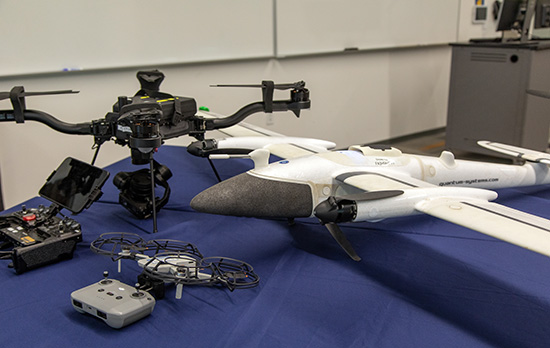Technology
Experts on drone research discuss future challenges and opportunities at UC Santa Cruz Silicon Valley campus
An interdisciplinary and multi-institutional group of academics, researchers, and practitioners discussed challenges and opportunities in using drones at an event hosted at the UC Santa Cruz Silicon Valley campus on Friday, September 27.


An interdisciplinary and multi-institutional group of academics, researchers and practitioners gathered to discuss challenges and opportunities in using drones for their cutting-edge work at an event hosted at the UC Santa Cruz Silicon Valley campus on Friday, September 27.
The event was organized by leaders of CITRIS at UC Santa Cruz. CITRIS and the Banatao Institute is a multi-campus research center that includes hubs at UC Santa Cruz, Berkeley, Davis and Merced, and works to shorten the pipeline between development of technology in the lab and its implementation and impact in the field. Researchers involved in drone research from all four CITRIS campuses and beyond attended and spoke at the event, along with representatives from local community colleges, institutions such as the United States Geological Survey, and more.
“One of the main goals of this workshop was to bring together researchers, academics, practitioners across a wide spectrum of disciplines. We need this conversation to be interdisciplinary to incorporate all the phases that are fundamental to the data management process, including data collection, data processing and making data FAIR, i.e., Findable, Accessible, Interoperable and Reusable,” said Katia Obraczka, the faculty director of CITRIS at UCSC and a professor of computer science and engineering. “We also need to think about how we are involving students at all levels — as a university, that’s our mission.”
The event followed the flow of using drone and sensor data for research and education, with a session for each stage of the process: the collecting of data with drones; processing, analysis and visualization of data; and ensuring data is Findable, Accessible, Interoperable and Repeatable (FAIR). A panel of researchers and practitioners addressed each of these topics, touching on what has been working well, opportunities for improvement, and how they see the field developing.
Assistant Professor of Applied Mathematics Javier González-Rocha, who uses drones for environmental monitoring research and spoke on the panel focused on data collection, noted his success in involving students in drone operation.
“What has worked best for me as a new faculty is recruiting bright talent. Students at UC Santa Cruz want to engage with opportunities to work with new technology and make an impact on the world,” González-Rocha said.
Researchers throughout the sessions emphasized the importance of making sure these data and technologies can benefit anyone who wants to work with them.
“We’re entering a golden age of open science, and it’s transforming all of our disciplines,” said Erin Hestir, the faculty director of CITRIS at UC Merced and an associate professor in civil and environmental engineering. “We’re seeing open access tools and the advent of open source software. It’s so exciting to see the innovation that has happened, which wouldn’t have been possible had these stayed behind paywalls.”
Alexandre Bayen, the director of the central branch of CITRIS and a professor at UC Berkeley, gave a keynote address on opportunities — sometimes unexpected ones — that may arise as drones continue to proliferate as a sensing and communications technology.
The event also served as a brainstorming session for CITRIS at UCSC’s application for a major NSF grant to support drone and sensor data infrastructure. They hope to bring in a mutli-disciplinary group of collaborators to ideate and participate in the potential funding opportunity.
In addition to Obraczka, the event was co-hosted by Executive Director of CITRIS at UCSC Michael Matkin, Director of the CITRIS Initiative for Drone Education and Research (CIDER) Rebecca Fenwick, and Jeffrey Weekley, Director of Research IT. The event was supported by the UC Santa Cruz Leading the Change initiative.